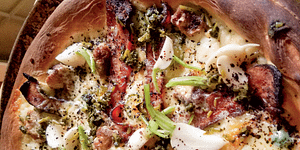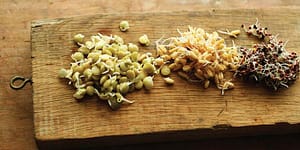Fresh Fig Pecan Bread

This fig pecan bread is a sweet, delicious, and nutritious side that everyone around the table will enjoy this winter (or maybe you’ll want to keep it all to yourself, we won’t judge). Enjoy!
The following is an excerpt from From the Wood-Fired Oven by Richard Miscovich. It has been adapted for the web.
What Is Fig Pecan Bread?
One of my favorite baking books—and one that gives me a lot of inspiration to develop new breads—is The Book of Bread by Jérôme Assire. It’s a beautiful book with great photos of breads from around the world.
I was ready to put a dried fruit and nut bread into production when I saw a collection of Swiss breads that included Sauserbrot made with wheat and spelt flours and including chestnut and grape must—unfermented freshly squeezed juice.
I dropped the juice and whole wheat flour but added a higher ratio of spelt flour and included walnuts, dried figs, and oats. I immediately recognized it as a slightly sweet bread that was also delicious, nutritious, and soothing. Have it at breakfast, at teatime, or as a bedtime snack.
Tips for Making Fig Pecan Bread
Be sure to use old-fashioned oats or the thicker, chewy kind you might be able to get through your local miller.
“Quick” oats don’t give the bread the same texture and don’t look as pretty on the outside of the loaf. Whole wheat flour can be substituted for the spelt flour, but the taste won’t be quite so distinctive. Whole-grain spelt flour and the addition of a high percentage of pecans and figs will make a denser dough.
Be aware that the dough will be delicate and that spelt has a shorter proofing tolerance than hard red winter wheat.
Making Substitutions
It took me several years to realize I should replace the walnuts in this formula with pecans, partly because a pecan tree grows right next to my ovenhouse. In the fall, local pecans are available at roadside stands and people stock their freezers with bags of the rich nut meats, more milky, tender, and fresh than those available in most stores. Enjoy fresh, local nuts if you are lucky enough to have access to them.
We’re also grateful when somebody drops off a load of pecan wood.
Using Pecan Wood
The logs split nicely, and the branches can be cut into manageable lengths with a pair of heavy-duty loppers and a reciprocating saw. Pecan wood provides fewer BTUs than oak, which means it is less dense.
This is an advantage when a fire is just starting and needs heat to accumulate so that the hot firebox will support a more complete combustion.
Oak requires a hot environment to get started, so it’s best to add pecan early on and save the oak for later. The pecan also combusts efficiently—little ash is left over after a load of pecan is burned.
We inherited three fig trees when we bought this property. Mid- to late July is when the figs start to ripen.
I like to harvest twice a day, once in the morning and again in the late afternoon when the sun warms the sweet and sensual fruit. I so appreciate these two local trees, pecan and fig, that give us beauty, shade, oxygen, fresh nuts, bountiful bowls of figs, and fuel.
RECIPE: Fig Pecan Bread

Best measured by weight; volume varies with ripeness.
Desired Dough Temperature
Adjust the water temperature so the dough is 77°F (25°C) at the end of mixing.
Lightly toast the pecans, chop them, and let them cool. (Be sure they are completely cool before adding them to the dough so they don’t affect the dough temperature.)
Before measuring the figs, remove any tough stems, chop the figs, and set them aside.
Autolyse
Remove 14g of starter from the levain. Pour the water around the edge of the levain to help release all of the preferment.
Add the water and levain to the mixing bowl. Add the flours and oats, but hold back all the other ingredients.
Mix by hand or a mixer until thoroughly incorporated and homogeneous, but you needn’t develop the dough at this point. It’s okay if the dough is still shaggy. Cover to prevent a skin from forming and autolyse for 20 to 30 minutes.
Mixing
By hand: After the autolyse, add the yeast and salt. Mix the dough with your hand and a plastic dough scraper for a minute to incorporate the ingredients.Turn the dough out of the bowl and knead by hand using the techniques described in chapter 6.
Hand mixing will take about 8 to 10 minutes. The dough is going to seem wet, but you’ll see the pecans and figs transform the consistency when you add them at this time.
By mixer: After the autolyse, add the yeast and salt and mix on slow speed for 3 minutes. Increase the speed to medium and mix for 3 minutes. Stop occasionally while mixing to scrape the dough off the hook. Reduce the mixer speed to slow, add the pecans and figs, and mix until incorporated.
When complete, the dough will be smooth and slightly tacky; it’ll pull back when tugged. Remember, the dough will develop considerably during fermenting and folding.
Primary fermentation
Place the dough in a covered container and let it ferment for 2 hours, folding once after 60 minutes.
Dividing/preshaping
Turn the dough onto a lightly floured surface and divide it into three pieces. Preshape each piece into a loose round ball, and place bottom up on a lightly floured surface. Cover the loaves and let them rest for about 20 minutes.
Shaping
Shape the loaves into bâtards. Roll each onto a damp cloth and then into a tray of oats. Place the loaves seam side up on a non-floured couche. Allow to proof for 1 to 1½ hours.
Scoring and baking
Just before baking, turn the loaves onto a lightly floured peel. Score with three angled cuts across the loaf. The oat coating makes scoring a bit difficult.
Be sure to use a new blade and score assertively. Bake in a steamed 450°F (232°C) oven. Or place in a heated combo cooker, score, cover, and place in the oven. Bake for approximately 40 minutes.
Recommended Reads
Recent Articles
Nothing says “spring” like a fresh, foraged meal! Savor the flavors of the season with this Milkweed Bud Pizza recipe.
Read MoreOxeye daisies are one of the most important plants for pollinators including beetles, ants, and moths that use oxeye daisies as a source of pollen and nectar. Instead of thinking about removing a plant like oxeye daisy, consider how you can improve the fertility and diversity of habitat resources in your home landscape, garden, or…
Read MoreWhat’s so great about oyster mushrooms? First, you can add them to the list of foods that can be grown indoors! They are tasty, easy to grow, multiply fast, and they love a variety of substrates, making oyster mushrooms the premium choice. The following is an excerpt from Fresh Food from Small Spaces by R. J.…
Read More








